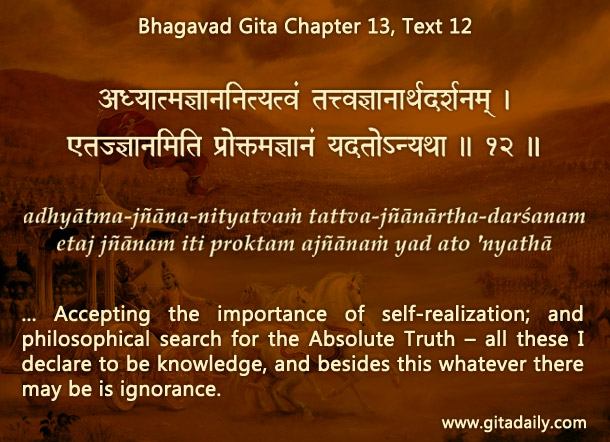Contextualizing absolute-sounding scriptural statements doesn’t minimize those statements; not contextualizing minimizes them
How do we make sense of absolute-sounding statements in wisdom-texts such as the Bhagavad-gita? Consider its declaration at the end of a list of twenty qualities: “This is knowledge; anything other than this is ignorance.” (13.12) What is the meaning of this absolute-sounding relegation of everything outside the list to ignorance?
The Gita’s conversants value other forms of knowledge. After the Gita is spoken, its student Arjuna fights a war for establishing order in society. In that war, Arjuna’s knowledge of archery proves crucial for his victory. And archery knowledge is not included in the Gita’s list (13.08-12).
The Gita is spoken for a particular contextual purpose: to help Arjuna arrive at a reasoned, responsible resolution to his dilemma about dharma, the right thing to do. This kind of decision-making can’t be done solely based on knowledge of skills such as archery. For such decision-making, what is critical is a character that is rich in virtue. And virtues comprise the Gita’s definition of knowledge; its relegation of other things to ignorance is meant not to dismiss knowledge of skills, but to stress the importance of virtues in sound decision-making.
By contextualizing the Gita’s absolute-sounding statements in such ways, are we minimizing those statements? Not necessarily. We might minimize them by not contextualizing them too. Here’s how. For accepting those statements, we require a faith that contradicts reason and experience. We might profess to have that faith, but we end up downplaying those statements by not thinking much about it. And by demanding such faith from thoughtful readers, we may alienate them; they may deem the entire Gita irrational.
To understand the Gita properly, we can draw on its rich commentarial tradition that has ensured its enduring relevance.
Think it over:
- How can we know that the Gita’s definitions of knowledge and ignorance are not meant to trash all other forms of knowledge?
- How can context help us understand the Gita’s definitions of knowledge and ignorance?
- How can we understand the Gita properly?
***
13.12: … Accepting the importance of self-realization; and philosophical search for the Absolute Truth – all these I declare to be knowledge, and besides this whatever there may be is ignorance.
To know more about this verse, please click on the image
Explanation of article:
Podcast:


nice,please keep it up